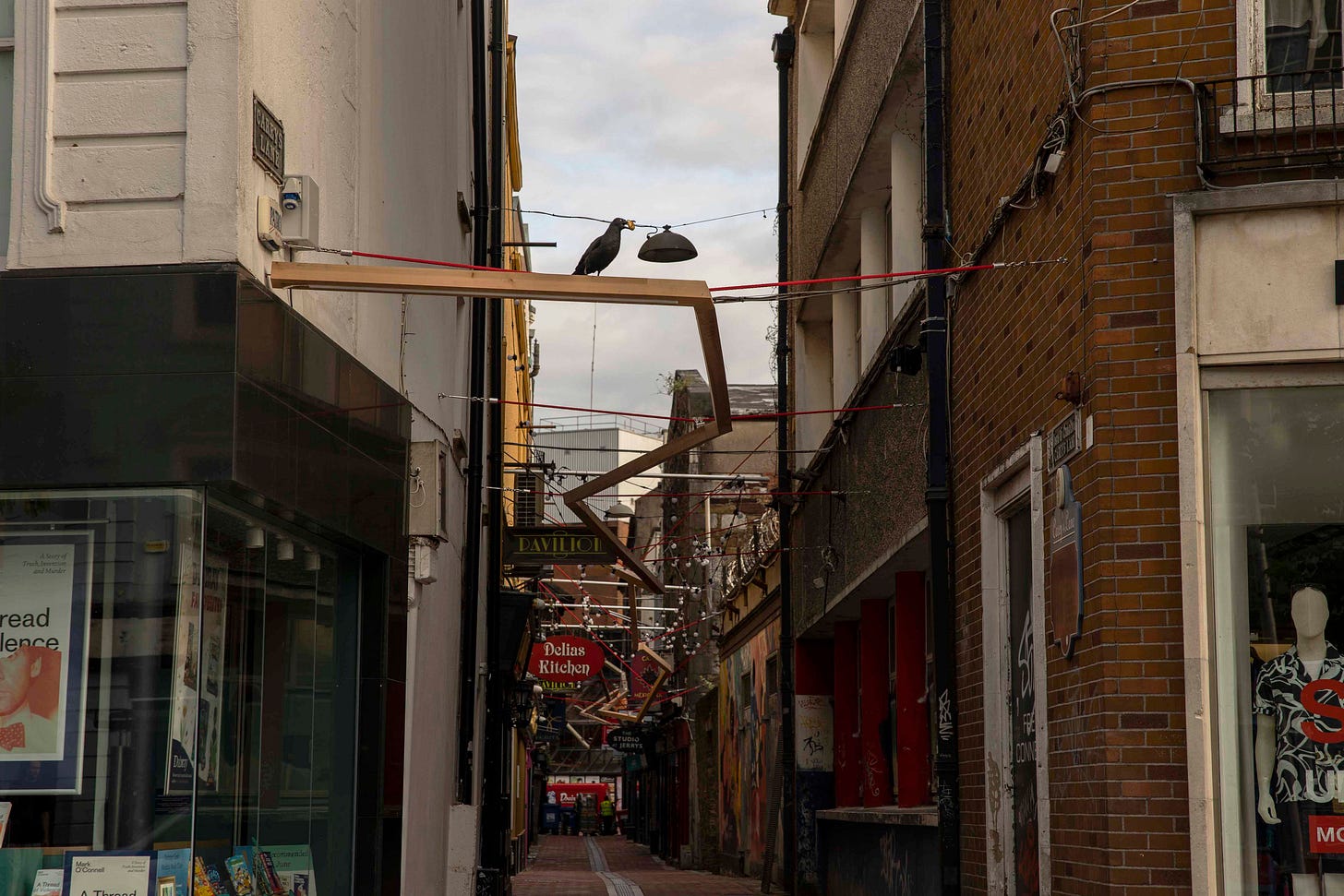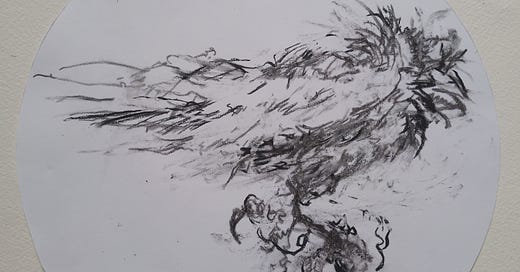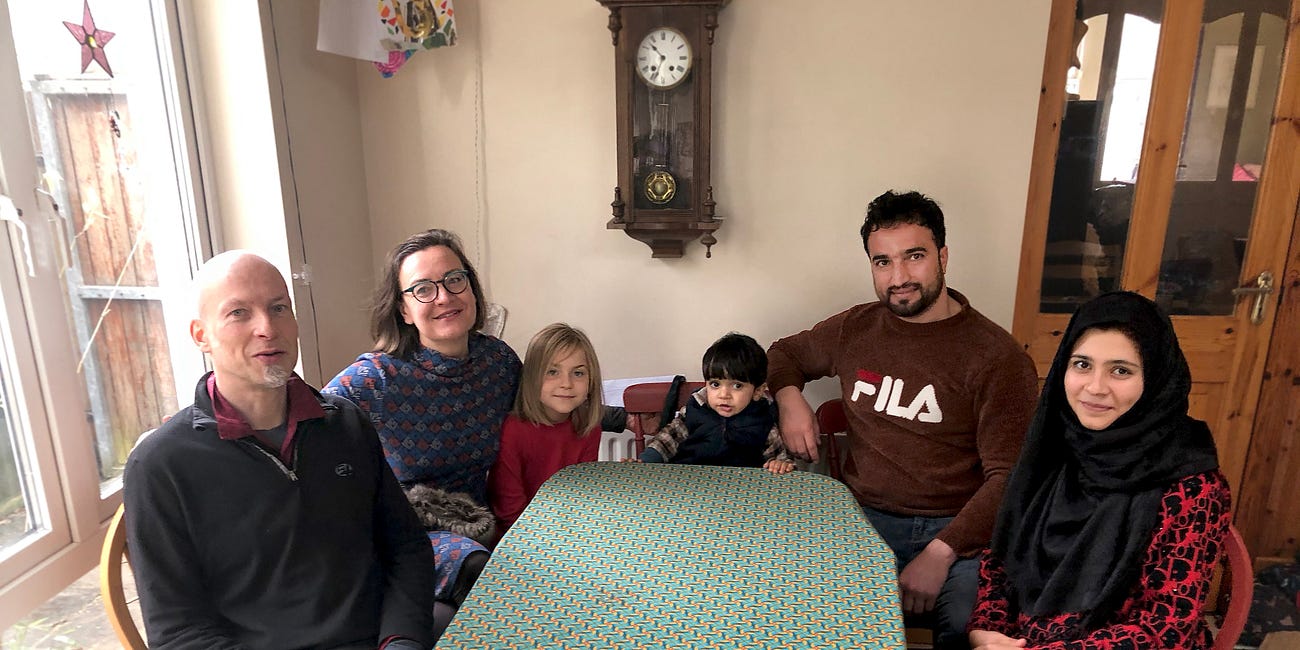The Friday View 30/06
The opportunity cost of RTÉ's payment scandal, an update from Cork City Marathon, there be birds on Carey's Lane, Denise O'Sullivan comes home for a proper send-off and Cork people #NeverLeaveCork
Dia dhuit and welcome to the Friday View. Thanks for subscribing and do help spread the word.
The way back for RTÉ
For the past week, RTÉ has found itself in the unusual and unwanted position of leading the news cycle (as opposed to reporting the news), owing to the growing scandal surrounding Ryan Tubridy's €345,000 "hidden payments," as well as a "slush fund" used to wine and dine advertisers with trips to a Champions League final and the Rugby World Cup in Japan in 2019. It is undoubtedly the biggest scandal in the national broadcaster's 63-year history.
In the week since, the anger has been unrelenting, especially from journalists and staff within RTÉ. It is understandable because for years, the message from management at RTÉ to staff has been to do more with less.
In 2022, Tubridy was paid €440,000 by RTÉ. However, we now know that the actual figure was €515,000 due to a €75,000 top-up arranged by his agent, Noel Kelly, and approved by RTÉ's former director general, Dee Forbes.
It's important to note that Tubridy, along with all the other individuals on RTÉ's "top talent" list, is supported by teams of producers, editors, and researchers working together to make the shows work. And work well.
What frustrates me is that the €75,000 "hidden payment" alone could have been used to hire a full-time journalist or dozens of freelancers to cover numerous underreported stories and issues that require more attention and exposure.
Since returning to Ireland from Japan, I have never come across a journalism job advertisement specifying a salary of that magnitude. In fact, most journalism jobs do not provide clear and defined salary information in their postings. (As RTÉ is publicly funded, they do advertise salary scales in job postings, and The Phoenix is to be commended for disclosing that they were offering €60k for a senior journalist position they recently advertised).
However, this issue is not exclusive to journalism, and there is legislation currently progressing through the Oireachtas that if passed will require employers to disclose salary information in job postings. Such a measure would be welcome, as would transparency in accurately reporting employees' actual salaries.
Journalism matters (a lot) to me and indeed all journalists. To the public too: one of the most common complaints I hear is, “Why don’t you report on X?” There’s no singular answer to this question, but journalism done right can result in stories that inform, entertain, enlighten and shed light on areas where people don’t want you looking.
RTÉ and other media organisations (T+D included) in Ireland do a good job at this type of journalism. Not always, but they do try.
What infuriates me is that RTÉ management could have used Tubridy’s top-up payment to employ a journalist to do exactly the type of journalism which is badly needed and wanted, or allocate the funds towards a project within RTÉ where journalists require additional resources. Instead, it was directed to the broadcaster's highest-paid employee through a concealed payment.
Ryan Tubridy clearly knows the value of journalism: he’s a talented broadcaster and routinely opens his radio shows with a purview of the morning’s papers.
Likewise, the management at RTÉ know the value and necessity of journalism. When I lived in Japan I regularly contributed to World Report on Radio 1 on Sunday mornings. It’s just one of the many quality journalism programmes from RTÉ (Prime Time, Docs on One to name two others). The path to rebuilding trust lies in reinforcing and prioritising programs like these and others, rather than facilitating car companies, talent agents, or offering incentives to advertisers.
The scandal has to lead to a reset at RTÉ management as well as a debate about how RTÉ is funded, how its board is governed, and how much its “top talent” should be paid relative to the work that is done across the teams they work on.
RTÉ is the most important journalism organisation in Ireland, especially as its journalism is accessible to everyone in Ireland. This point carries immense importance, considering the fragmentation and increasing use of paywalls in the media landscape, which in turn creates disparities between those who have access to news and those who do not (the news haves and have nots).
There has been some excellent reporting on the RTÉ payments scandal right across the Irish media, not least by RTÉ, but RTÉ is one of the few media organisations you can read it on your phone or laptop for free. Its reach is immense.
To regain trust, RTÉ management needs to double down on journalism and a real commitment to transparency from its management. Leave the dodgy and secretive payments, kowtowing to agents, sponsors and talent, and wining and dining at elite sporting events to script writers working on dramas that are purely fictitious and bear no resemblance to actual events…at RTÉ.
-JJ

News in brief:
A mea culpa, of sorts: You may recall that following the Cork City Marathon, which took place on June 4, some runners complained after the race about the lack of water at the water stations. We also reported on the discrepancy in the official numbers released regarding the actual number of runners who participated. I asked event organisers, Davis Events Agency, for clarification, but received no response. However, this week, the Cork City Marathon Team (no names mentioned) provided some answers regarding the water shortages.
According to the email sent to the runners, the organizers claimed that 60,000 bottles of water were "ordered and delivered." As several thousand bottles were leftover, the race organisers stated that there were actually no water shortages. Instead, they attributed the issues to logistical and resupply problems. Although no one was singled out, the email did mention that "the Defence Forces kindly organised the distribution of water to the water stations and throughout the course for the event."
The mail makes no mention of volunteers who staff the water stations, but goes on to say that there will be extra security and resources to ensure that this does not happen for future races.
In the spirit of honesty and clarity, we’d still like to know how many racers actually ran? Perhaps the organisers’ communications agency can help?
A hero's send-off: Denise O'Sullivan returned home to Courtown Drive in Knocknaheeny this week ahead of the Irish women's team's unveiling for the upcoming women's football World Cup in Australia and New Zealand. Ireland has been drawn in a group with hosts Australia, as well as Nigeria and Canada.
For O’Sullivan, inclusion in the the World Cup squad caps an incredible career which has taken her to the UK and the US, where she now plays club football with North Carolina Courage. A great crowd turned out to show their support for the midfielder who started her career with Nufarm Athletic. We wish Denise and all the girls in green the very best for what promises to be a cracker of a World Cup.
#GotCork?: New Lord Mayor Cllr Kieran McCarthy has taken to the role and to social media with all the verve of a…new Lord Mayor. He’s also settled on a slogan, #GotCork, which he has been using unfailingly. Get it? Neither do we.
Sticking with Cork, new statistics from the Central Statistics Office (CSO) show that Cork has the highest percentage of residents living in their native county: 72% or 418,259. It is evident that Cork people #LoveCork #NeverLeaveCork, which, although not surprising, could make for a more impactful hashtag campaign. Another noteworthy statistic from the preliminary figures by the CSO is that the population of Cork has not yet returned to pre-Famine levels.
Tweet of the week:
School’s out, and so gifts were passed round to teachers, SNAs and traffic wardens this week. Former Cork City councillor Fiona Ryan tweeted the tea cozy one child’s grandmother made for Fiona’s mother Bernie, a traffic warden, to say thanks for keeping all the kids safe this year. Give that lady a TikTok account!
Out + About
🖼From the garden: For By Nature, now showing at MTU’s Cork School of Music, artist Gillian Cussen used inks made from plants in her garden and bits of found metal in her garden. The drawings were created in her garden. Favouring the “blind method” of drawing, Gillian prefers to concentrate on the subject rather. The result is, as she says, less a representation of its likeness but more about its vitality and essence. More information here.
Time, date, place: Daily until July 4, MTU Cork School of Music, Union Quay.
🖼Soul engravings: Ballincollig-based self taught Polish artist Artur Grejner’s retrospective opened this week at Galley 46, MTU’s cultural outpost on Grand Parade. “Soul Engravings'' is Artur’s first solo exhibition in Ireland and will include examples of his work from the past 20 years. More information here.
Time, date, place: 11am - 4pm June 28 - July 13, MTU Gallery, 46 Grand Parade
🎶Gliogar’s return: After a short break, Gliogar Ceol’s monthly free gig at the Corner House makes a return this Friday. Experimental folk and trad-influenced trio Ana Palindrome will be taking the stage, after supporting Mount Eerie at the Green Room earlier this month. Catalonian via Cavan folk singer Rita Perry will also be playing. Expect experimentation and some lovely sounds. Poster here.
Time, date, place: 8pm, June 30, The Corner House, Coburg Street
🎞Cosmism in Cobh: New York and Berlin-based artist Anton Vidokle will be launching his latest exhibition, Anton Vidokle and the Institute of the Cosmos, at the Sirius Arts Centre in Cobh on Saturday. The exhibition features four films that explore Vidokle’s interest in Cosmism, a utopian philosophy which emerged from the pre-Stalinist Soviet Union. Vidokle will be talking to art historian Sarah Wilson about the concepts behind the exhibition and Cosmist ideas and imagery on Saturday, at 3pm. More information here.
Time, date, place: 12pm-5pm, July 1 - October 28, Sirius Arts Centre, Cobh
📸Eyes on the underground: Photographer Maclaine Black’s first solo exhibition, Faoi Thalamh, is an exploration of Cork’s techno culture, raves and various subcultures. It features ninety-two photographs from underground techno events around Cork, by Dali, Kriptik and 3ip.ka, and documents what the artist calls a “rebirth of techno culture in Cork”. The exhibition takes place at St Peter’s from the third of July, with a launch event on Friday 7 at 7pm. More information here.
Time, date, place: 10am-5pm, July 3 - 17, St. Peter’s, North Main Street.
🎼Summer sounds: Next up in the summer musical series at the Opera House’s Half Moon Place cafe is Clare folk singer and uileann piper Seán Lyons. I recently started listening to Juliana, an EP which Seán released this year. There’s hints of the great Andy Irvine in some of the songs which Seán sings as Gaeilge agus in English. Definitely one to hear, and watch. Listen to that album here.
Time, date, place: 1-2pm, Tuesday July 4, Cork Opera House
🖼Meant to Fade, which Ellie wrote about this week, closes at the Laneway Gallery on Shandon Street this Saturday, July 1 with a closing public event from 5pm until 7pm. You can read Ellie’s piece in full below.
Art that's meant to fade
“My body will be happily decomposing in the ground, but my work will be leaching chemicals into the environment? That’s pretty disturbing.” Artist and curator Katerina Gribkoff is contemp…
That’s it for this week’s Friday View. Any tips, news or events you’d like to share with Tripe+Drisheen, you can contact us via our About page here. We are always happy to speak to people off the record in the first instance, and we will treat your information with confidence and sensitivity. Get in touch. Have a lovely weekend.
From the T+D archive:
An 8,250km journey to Cork and to safety
Hamed Naderi doesn’t have clear memories of the last time the Taliban ruled Afghanistan. He was too young. He’s 29: the Taliban were formed in the first year of his life, and came to power for the first time when he was just three. “M…











RTE- yes to supporting more journalists - to acknowledging the teams behind the talent and to more transparency - great little article summing it up, thanks JJ